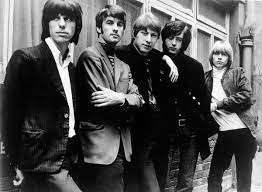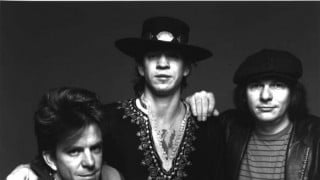Although Bloodline did not become a famous act, it attracted some attention to Bonamassa's guitar chops. Bonamassa's debut studio album A New Day Yesterday was released in 2000, and features both original tunes and covers of such artists as Rory Gallagher, Jethro Tull, and Warren Haynes. The album features a guest appearance by Gregg Allman on the tune "If Heartaches Were Nickels" and was produced by Tom Dowd. The album reached number 9 on the Billboard Blues chart. Between 2002 and 2006, Bonamassa saw three studio albums hit number 1 on the Billboard Blues charts, and all five of his solo studio albums made the top 10. In 2009 Bonamassa fulfilled one of his childhood dreams by playing at the Royal Albert Hall in London, where Eric Clapton played a duet with him. Bonamassa's live album Beacon Theatre–Live from New York was released in 2012. The show featured one of Bonamassa's musical heroes, Paul Rodgers, formerly of the bands Free and Bad Company, as a guest. March 26, 2013 saw the release of his live acoustic album An Acoustic Evening at the Vienna Opera House, which was released as a CD/DVD/Blu-ray set.This concert marked the first time Bonamassa played a wholly acoustic show. The acoustic ensemble that performed the show was assembled with the help of Bonamassa's longtime producer, Kevin Shirley. The concluding, three-night stand of Bonamassa's spring 2013 tour occurred at the famous Beacon Theatre in New York City. Over the summer of 2013, Bonamassa performed four shows in London featuring three different bands and, at one show, a horn section, covering four different sides of his music. Each show had a unique setlist. The shows were recorded for a DVD release and the set of DVDs was released in October, 2013 under the name "Tour de Force." On December 6, 2013, Bonamassa and Beth Hart were nominated for a Grammy Award for their 2013 collaborative album SeeSaw in the Best Blues Album category. Bonamassa's album Different Shades of Blue is his first solo studio album since So, It's Like That to showcase only original songs, except for one short instrumental Jimi Hendrix cover. The Hendrix cover is a 79-second partial performance of "Hey Baby (New Rising Sun)." To write the album, Bonamassa went to Nashville and collaborated with three songwriters there: Jonathan Cain, who has written for Journey; James House, known for his work with Diamond Rio, Dwight Yoakam, and Martina McBride; and Jerry Flowers, who has written for Keith Urban.
Bonamassa explained to the writers that he wasn't interested in creating three-minute radio hits, but just wanted to write some serious blues rock. The recording of the album was accomplished in Las Vegas at a music studio in the Palms Hotel. On the charts, the album reached number 8 on the Billboard 200, number 1 on the Blues Chart, and number 1 on the Indie Chart as well. In May 2015 Bonamassa won a Blues Music Award in the 'Instrumentalist - Guitar' category. In April 2018 Bonamassa's signature amplifier the ‘59 Twin-Amp JB Edition was released by Fender Musical Instruments Corporation. On June 27, 2018, Bonamassa premiered at the Grand Ole Opry when he made a guest appearance after being introduced by Chase Bryant and playing along with him in his final song of the set, "I Need a Cold Beer." Bonamassa was first exposed to Beth Hart's music after seeing her play several television performances. The two would often cross paths when playing shows separately in Europe, and Bonamassa became very impressed with Hart when he caught her show at the Blue Balls festival in Lucerne, Switzerland. While recording his album Dust Bowl and listening to the expanded edition of the Rolling Stones' Get Yer Ya-Ya's Out! that features tracks by Ike and Tina Turner, Bonamassa became inspired to try pairing up with a woman, and Beth Hart came to mind. The two musicians met up in a hotel bar in Dublin and soon Bonamassa floated the idea, which Hart accepted immediately, although she was at first under the impression that he was asking her to sing backup vocals on his next album. When she realized that his intention was for her to sing lead vocals, she said "I was floored". Bonamassa, Hart, and producer Kevin Shirley wrote down lists of soul songs they liked to come up with material for the album, which was named Don't Explain. The group settled on twelve songs, although only ten ended up being recorded. Bonamassa and Hart chose five songs for the album each. Some of Hart's favorite tracks on the album, included "For My Friend" by Bill Withers and "Sinner's Prayer" by Ray Charles. Bonamassa had always wanted to do versions of Brook Benton's "I'll Take Care of You" and "Well Well" written by Delaney Bramlett & Bonnie Bramlett. Their follow-up album, Seesaw was nominated for a Grammy Award in the category of Best Blues Album. On January 26, 2018, Beth Hart and Joe Bonamassa released Black Coffee, produced by Kevin Shirley. Bonamassa serves as the guitarist for the hard rock supergroup Black Country Communion. The band released their fourth studio album, "BCCIV" in September 2017. He is also a member of the jazz-funk band Rock Candy Funk Party. They released their debut album, We Want Groove in 2013 and followed it up with Rock Candy Funk Party Takes New York - Live at the Iridium. The show was recorded over a three night stand at the Iridium Jazz Club in New York City. The band played Conan on February 10, 2014. Bonamassa produced podcasts between January and July 2015 with another guitar aficionado, Matt Abramovitz.
The episodes are about "the life and lore of the guitar", with Bonamassa and Abramovitz going in depth about their favorite guitars, guitarists, and occasionally non-guitarists associated with the blues and rock genres. Unlike many blues rock guitarists that came before him, Bonamassa's influences are British and Irish blues acts rather than American artists. In an interview in Guitarist magazine he cited three albums that had the biggest influence on his playing: John Mayall & the Bluesbreakers with Eric Clapton (the Beano album), Rory Gallagher's Irish Tour and Goodbye by Cream. He also noted that Stevie Ray Vaughan's Texas Flood had a big influence when Bonamassa was young. Among other bands, he listed the early blues playing of Jethro Tull as an influence, and named both Martin Barre and Mick Abrahams as important musicians to him. He elaborated on his influences in a 2007 interview: "You know, my heroes were the Columbia guys – Paul Kossoff, Peter Green, Eric Clapton. There’s so many – there’s Gary Moore, Rory Gallagher – another Irish musician who played the same things, but don't tell him that. But those guys were my guys – Jeff Beck, Jimmy Page. There's a certain sophistication to their approach to the blues that I really like, more so than the American blues that I was listening to. B.B. King's a big influence – he's probably my biggest traditional influence. I love Muddy Waters, Robert Johnson and T-Bone Walker and stuff like that, but I couldn't sit down. I was always forcing myself to listen to whole records by them, where I'd rather listen to Humble Pie do "I'm Ready" than Muddy Waters, you know? I think, the English interpretation of the blues just hit me a lot better, you know?" In an October 2008 interview with Express & Star he said: "When I heard Kossoff playing "Mr. Big" and when I heard Clapton playing "Crossroads" and when I heard Rory Gallagher playing "Cradle Rock", I was like, 'This is way cooler'.... "British blues are my thing. When I heard Rod Stewart and the Jeff Beck Group singing "Let Me Love You", it changed my life. I knew exactly what I wanted to do. Those are my influences". And in an December 2012 interview with MusicRadar: "My friends would ask me, 'Have you heard the new Van Halen record?' And I'd be like, 'Nope.' I was listening to Frank Marino and Mahogany Rush".


.webp)













